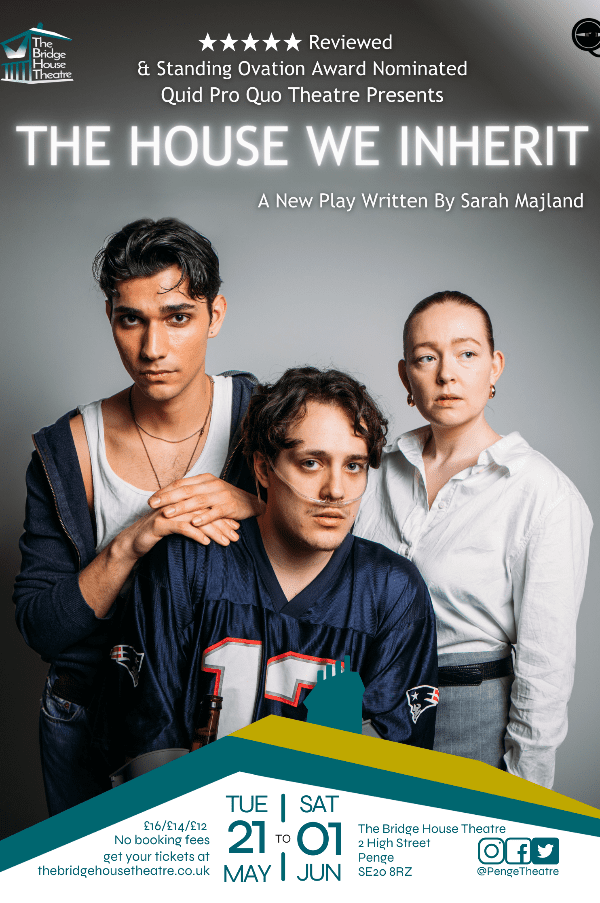INTERVIEW with Theatre Company QUID PRO QUO on their upcoming show THE HOUSE WE INHERIT at Bridge House Theatre, Penge 21 May – 1 June
The play focuses on three siblings who are forced to face their past when they reunite in their family home after their brother, Timmy, has an accident. The House We Inherit is a story about love, loss, family and the impact of the truth - and how we move on.
Three company members playing the sibling in the show, Sarah Majland, Öncel Camci and Boyan Petrov chat about the company and their roles in the play . Sarah is also the playwright and gives further insights into this poignant and relatable piece of new writing.
LPT: We’re pleased to have this opportunity of finding out more about the company and your current play. Firstly, could you give a brief background to the company.
Öncel: We met at drama school at East 15 and found out, after having worked together on multiple productions, including a festival of new work, that we wanted to keep creating work together. Coming from very different backgrounds and being very different people, we found that our different skill sets and different tastes united in a shared vision for art and theatre which ultimately became Quid Pro Quo.
LPT: Sarah, could you tell us something about the inspiration behind the play?
Sarah: This is a special play because it is written for us as a company and to our specific strengths (and things we are wanting to develop as actors.) It’s a family drama that delves into our childhood and all the things we never talked about, but which ultimately shaped us. It’s very interesting to me how, in families, there is so much that we never address, and I wanted to explore a situation where we are suddenly forced to face all that and what happens if we do.
LPT: The three of you are playing the siblings, are any of you drawing on your own experiences?
Sarah: For me there is definitely some common ground with Helena. She’s moved away from her small-town life to pursue her dreams in the big city - but the escape from her childhood home is just as much an escape from her past. It is weird to come back to your hometown and I find that it confronts me with my childhood every time I go back. I guess it is the dream of finding happiness somewhere else and realising that you can’t just geographically move away from your trauma - it’ll follow you if you don’t face it.
Boyan: Even though the play is not based on true events, I feel like the dynamic between the siblings, and how they deal with their issues in general, is very universal and relatable to all of us.
LPT: Siblings just shouts power-play which is often quite exciting in theatre. Could you tell us more about this aspect of the play?
Sarah: In families we are often assigned different roles, and whether we like or not there is a certain hierarchy where each has to act their part. In this case there is Timmy who took over their childhood home, and who holds very traditional family values which clashes with Helena, the oldest sibling who moved away to become an artist and has moved miles away from the environment they were brought up in.
Boyan: As the older sibling with a natural authority, there is definitely an immediate conflict, and perhaps some feelings of hurt and betrayal, between her and Timmy. And Kevin, the youngest sibling, stuck in the role as Timmy’s caretaker, is right in the middle of it as some sort of mediator/punching bag to everyone in the family.
Öncel: Add to that being adopted and always feeling a little but like an outsider in your own home, and a whole history not shared with your siblings.
LPT: The three of you are self-directing this play. Might there be a bit of power play going on here also?
Öncel: We’re all very opinionated and have strong personalities, and when it works - which is most of the time, it’s what makes us us. Sometimes we clash, but we always find a middle ground.
Sarah: I think any clashes are really just a testament to being three individuals with big ideas and lots of passion for what we do - which is ultimately my favourite thing about working with these two.
Boyan: The truth is born in the debate, we say in Bulgaria.
LPT: Sarah, we wondered why the play is set in small New England-town? How is this different to any other location (say, for example, somewhere in England)?
Sarah: I wanted the play to have a focus on small-town versus big city, which is an interesting theme for me in the States that has such vast land and big geographical distances, along with a very torn political climate where different values rule different places. As a writer I am also interested in how your geographical surroundings shape you, and it was exciting to me to see how setting it in the States would inform the characters. It is a very universal theme though, and I think I could’ve chosen to set it really anywhere in the world - I’ve written stuff set in my own home-country, Denmark, before, but being an international I was interested in exploring somewhere new and sort of delving into that mindset.
LPT: You all met at East15 acting school, does this mean that you all have a similar style of acting? Could you tell us more about this?
Sarah: Having trained at the same drama school definitely has shaped us to be actors with a common ground. However, during our training we explored many different styles of acting, but we all found home in techniques that offered deep connection and that allowed the actors to act freely and creatively.
Boyan: That’s why we don’t block or pre-plan our performances, but instead do vigorous character work and explorations of the text and the world of the play, so that we then can build on that and act and re-act authentically, spontaneously and afresh every night. This is all built on Mike Alfred’s’ and Stanislavsky’s work.
Öncel: And we always love to give our own creative take on a play and work with tech, music and creative world-building.
LPT: Past productions include your well received show ‘A Woman on Fire’ also written by Sarah. Do you find that there is something in technique or style that is unique to Sarah’s ‘voice’?
Öncel: Sarah’s plays always move me. She writes complicated characters that you can find some of yourself in all of them. I remember reading one of the early drafts of A Woman On Fire on my bed late at night and I couldn't hold my tears when Oliver left Mark. When I read The House We Inherit, again, suddenly my laptop screen started getting very blurry during one of Kevin’s monologues towards the end of the play.
Boyan: She has a natural instinct for exposing the truth in our behaviour. And what I’ve always loved about her plays is that the dialogue is so clever and juicy - it’s a delight to perform as an actor.
LPT: How are you approaching this play? Is it different to your approach for past productions?
Boyan: The main difference really is not having an outside director. We decided that we will develop this play as an ensemble, from working on the script, to all the conceptual elements we’ve added to the show, the original score from Öncel, to acting choices in the room - everything begins and ends with us here. We’ve of course had tremendous help from people coming in and feeding us back, but quintessentially this is our creation and we’re very proud and excited to share it with the audience.
LPT: Finally, what do you hope audiences will take away from the show?
Öncel: I feel like all of our projects we’ve done so far have been about facing your demons, and by running away from our trauma we deny ourselves to live fully and freely.
Sarah: That is really a life lesson for me and something I haven’t got down yet, that’s probably why it is such an important topic to treat.
Boyan: Ultimately it is appreciating your family while you have them. Remembering and accepting what you come from, and trusting the people that matter will be there to help you go through both the good and the horrible times of your life.







